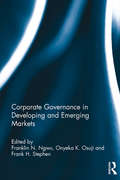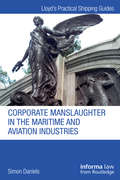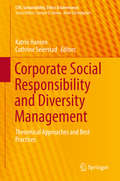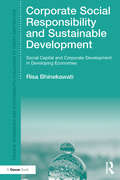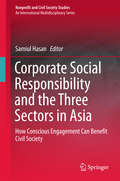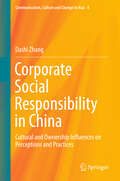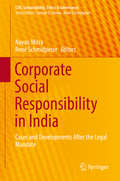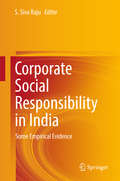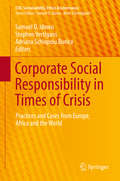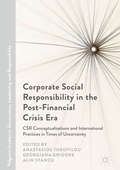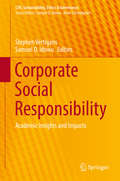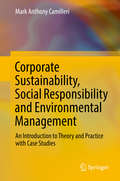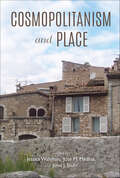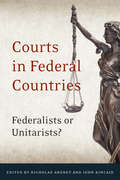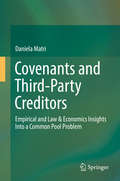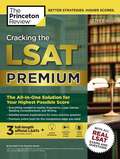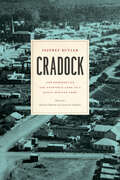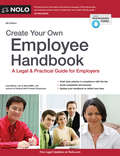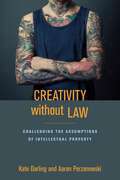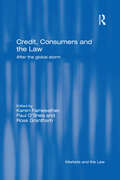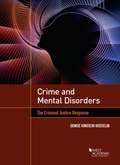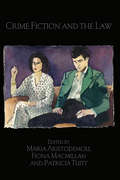- Table View
- List View
Corporate Governance in Developing and Emerging Markets
by Franklin N. Ngwu Frank H. Stephen Onyeka K. OsujiThroughout the world, the Anglo-American model of corporate governance tends to prevail – but no two countries are identical. Governance outcomes in developing and emerging economies often deviate from what theory predicts, due to a wide range of factors. Using insights from New Institutional Economics, Corporate Governance in Developing and Emerging Markets aims to explain the different issues and cultural and legal factors at play, and put forward an alternative governance framework for these economies. Structured in three parts, this text investigates different models of corporate governance; it explores the realities of corporate governance in ten nations, including the ‘BRICS’ (Brazil, Russia, India, China and South Africa) and ‘MINT’ (Mexico, Indonesia, Nigeria and Turkey) countries; and then considers corporate governance reform. This interdisciplinary text will be a valuable tool for students of corporate governance across Business, Economics and Law; and an equally useful resource for anyone working in or carrying out research in this area.
Corporate Manslaughter in the Maritime and Aviation Industries (Lloyd's Practical Shipping Guides)
by Simon DanielsThis book provides expert analysis of the application of the evolving law in Corporate Manslaughter as it relates to the Maritime and Aviation industries. It will prove to be a useful tool for practitioners and students in this specialised area, as well as those working in the maritime and aviation industries, such as those who will be accountable under the Corporate Manslaughter Act 2007; the Masters and Pilots who manage the risks; and the insurers who underwrite the cost of the risks. The author will discuss areas such as: The liability towards passengers and employees The Prosecution of offenders Comparative analysis of corporate manslaughter in the wider, global industry
Corporate Social Responsibility and Diversity Management: Theoretical Approaches and Best Practices (CSR, Sustainability, Ethics & Governance)
by Katrin Hansen Cathrine SeierstadThis book highlights the most critical aspects of diversity and their implications for Corporate Social Responsibility (CSR), examining them in a collection of conceptual and practical contributions from researchers and practitioners alike. In particular the book discusses good and best practices for diversity management and analyzes possible links between CSR and diversity within organizations. Examples are drawn from a diverse range of organizational settings including corporations, educational institutions and other (non-profit) organizations and in various countries, including Germany, the UK, the USA and India.
Corporate Social Responsibility and Sustainable Development: Social Capital and Corporate Development in Developing Economies (Finance, Governance and Sustainability)
by Risa BhinekawatiMany different companies can significantly contribute to the integrated goals and targets of the United Nations’ sustainable development goals, such as poverty reduction by 2030. Poverty is not only about people living on less than $1.25 per day, but more fundamentally, it is their lack of capabilities and access to participate in productive economic activities. If companies can contribute in order to provide access and the necessary skills, then individuals will have the capabilities to achieve their aspirations, including earning a higher income. Corporate Social Responsibility and Sustainable Development supports Sen’s assertions that poverty can be alleviated if the capability of individuals is improved. Beyond that, this book shows that sustainable development goals can be achieved when the company’s CSR programs and social capital development in improving people’s capabilities are combined with necessary finance access and market access for the poor. The theoretical model developed from the journey of Astra International, one of the largest public-listed companies in Indonesia, is replicable for other companies aspiring to be sustainable in developing countries. The model shows a virtuous cycle between the corporate aim, CSR programs, social capital and corporate sustainability. This volume is of great value to academics, practitioners and policy makers interested in the themes of CSR, social capital and sustainable development of developing countries. It also appeals to professionals in industry associations, development agencies and international organizations, as well as NGOs that are concerned with the achievement of sustainable development goals by 2030.
Corporate Social Responsibility and the Three Sectors in Asia: How Conscious Engagement Can Benefit Civil Society (Nonprofit and Civil Society Studies)
by Samiul HasanThis volume investigates how much governmental control is needed to reign in corporate and business greed and to make business "socially responsible" in Asia. It also questions whether business entities need to be reigned in by the government itself, or if other social, religious, or economic dynamics shape business entities in Asia. Moreover, it looks at how the Asian third sector influences BSR/CSR activities.
Corporate Social Responsibility in China: Cultural and Ownership Influences on Perceptions and Practices (Communication, Culture and Change in Asia #4)
by Dashi ZhangThis book explores how the traditional Chinese culture and business ownership influence corporate social responsibility in China. By comparing state-owned enterprises, private companies and multinational companies, it shows how corporate social responsibility is perceived and practiced at the corporate level in these companies. It also studies how intertwined company practices and the Chinese culture are, and how this relationship affects the business environment in China. Further, it highlights the value of economic factors in corporate social responsibility, and the influence of Chinese philosophy on corporate ethics. It is a valuable tool for researchers and academics wishing to understand the dynamics of corporate social responsibility in China and discover the significant influencing factors in China's business arena.
Corporate Social Responsibility in India: Cases and Developments After the Legal Mandate (CSR, Sustainability, Ethics & Governance)
by René Schmidpeter Nayan MitraThis book provides a comprehensive overview of Corporate Social Responsibility (CSR) in Indian corporations following the 2013 legal mandate on corporate spending of profits for CSR. Bringing together authors hailing from diverse walks of life, the book pursues a 'hands-on' approach, with real-world case studies and examples that help the reader feel the dynamic pulse of India immediately after the ratification of the CSR mandate in the Companies Act, 2013. The Act is expected to affect over 16,300 companies with an estimated flow of approximately 200 billion Indian rupees into the economy every year, thus shaking the foundations of business and society and impacting the country at multiple stakeholder levels. As a result, India is likely to become the birthplace of social, economic, and environmental transformation through financial investments in CSR! In order to insightfully reflect on this transition, this book has been divided into three parts. The first part presents the CSR mandate and its implications, while the second focuses on its implementation and the third part provides a view on the way forward. The book helps to reveal the various layers of CSR in an emerging economy like India and is expected to spark debate, discussion and research among policy-makers, consultants, academics, practitioners and other stakeholders the world over, which will further expand its contribution to CSR literature and open up new vistas in CSR research. "This is indeed a first of its kind book and marks a watershed in the journey of CSR. It is an extremely important contribution to the body of knowledge in the area of CSR and Corporate Goverance in emerging economies that is driven by a completely different set of challenges, opportunities and requirements from that of developed economies. " Dr. Bhaskar Chatterjee, Director General & CEO, Indian Institute of Corporate Affairs
Corporate Social Responsibility in India: Some Empirical Evidence
by S. Siva RajuThis book presents the authors' recent field experiences of corporate social responsibility (CSR) activities in different regions of India. It also demonstrates how social auditing and stakeholder mapping help analyze the impact that particular individuals or groups may have on the functioning of any company in an area. CSR is a rapidly growing area of research and activity, especially in developing countries like India. An increasing number of companies are realizing their own social responsibility, given that they work within societal networks. As a result, any initiation or expansion activity they carry out in society impacts the communities around them. Given the newness of the field, the work on CSR in India is still in the initial stages. Most importantly, there is a need to highlight issues concerning CSR activities using sound methodologies and scientific data. A database comprising qualitative and quantitative approaches collected by tracking CSR activities is invaluable. Further the scientific data is vital to fully understand CSR, and in turn helps in designing appropriate and effective interventions for improving community members' quality of life. Accordingly, the stakeholders associated with CSR need to have a sound knowledge of how to conduct studies related to baseline data generation, community needs assessments, community profiling, stakeholder mapping, social impact assessments, monitoring and evaluation, as well as the social auditing of CSR projects and other related issues. This book aptly covers these issues and offers supporting empirical evidences from the field.
Corporate Social Responsibility in Times of Crisis: Practices and Cases from Europe, Africa and the World (CSR, Sustainability, Ethics & Governance)
by Samuel O. Idowu Stephen Vertigans Adriana Schiopoiu BurleaThis book explores national and transnational companies' Corporate Social Responsibility (CSR) activities in times and settings in which they are confronted with economic and social challenges and analyzes these situations, ranging from the financial crisis to fourth generation sustainability. Presenting a number of different cases from various parts of Europe, North America and Africa, it showcases how companies respond to the challenges of the development, consultation, implementation, integration, measurement and consolidation of CSR. Further it specifies how these corporations deal with uncertainties over corporate and financial resources, global financial stability and growing evidence for climate change. The book describes CSR adaptation under challenging circumstances and argues for the strategic and operative legitimation of Corporate Social Responsibility in times of crisis.
Corporate Social Responsibility in the Post-Financial Crisis Era: CSR Conceptualisations and International Practices in Times of Uncertainty (Palgrave Studies in Governance, Leadership and Responsibility)
by Anastasios Theofilou Georgiana Grigore Alin StancuBringing together normative and instrumental CSR conceptualizations, practice based examples and international case studies, this edited volume brings together important contributions on the conceptualizations of CSR post financial crisis. Including coverage of a variety of practices in developing and developed contexts, industry-specific activities, business ethics and sustainable development issues, Corporate Social Responsibility in the Post-Financial Crisis brings together a variety of perspectives to provide knowledge and understanding across contexts.
Corporate Social Responsibility: Academic Insights and Impacts (CSR, Sustainability, Ethics & Governance)
by Samuel O. Idowu Stephen VertigansThis work collects the most important results presented at the Congress on Differential Equations and Applications/Congress on Applied Mathematics (CEDYA/CMA) in Cádiz (Spain) in 2015. It supports further research in differential equations, numerical analysis, mechanics, control and optimization. In particular, it helps readers gain an overview of specific problems of interest in the current mathematical research related to different branches of applied mathematics. This includes the analysis of nonlinear partial differential equations, exact solutions techniques for ordinary differential equations, numerical analysis and numerical simulation of some models arising in experimental sciences and engineering, control and optimization, and also trending topics on numerical linear Algebra, dynamical systems, and applied mathematics for Industry. This volume is mainly addressed to any researcher interested in the applications of mathematics, especially in any subject mentioned above. It may be also useful to PhD students in applied mathematics, engineering or experimental sciences.
Corporate Sustainability, Social Responsibility and Environmental Management: An Introduction to Theory and Practice with Case Studies (Csr, Sustainability, Ethics And Governance Ser.)
by Mark Anthony CamilleriThis book provides a concise and authoritative guide to corporate social responsibility (CSR) and related paradigms, including environmental responsibility, corporate sustainability and responsibility, creating shared value, strategic CSR, stakeholder engagement, corporate citizenship, business ethics and corporate governance, among others. It is primarily intended for advanced undergraduate and / or graduate students. Moreover, it is highly relevant for future entrepreneurs, small business owners, non-profit organisations and charitable foundations, as it addresses the core aspects of contemporary strategies, public policies and practices. It also features case studies on international policies and principles, exploring corporate businesses’ environmental, social and governance reporting.“Mark Camilleri’s new book provides an excellent overview of the eclectic academic literature in this area, and presents a lucid description of how savvy companies can embed themselves in circular systems that reduce system-wide externalities, increase economic value, and build reputation. A valuable contribution.”Charles J. Fombrun, Founder of Reputation Institute and a former Professor of Management at New York University and The Wharton School, University of Pennsylvania, USA“I am pleased to recommend Dr. Camilleri’s latest book, Corporate Sustainability, Social Responsibility, and Environmental Management. The book is a rich source of thought for everyone who wants to get deeper insights into this important topic. The accompanying five detailed case studies on a wide array of corporate sustainable and responsible initiatives are helpful in demonstrating how theoretical frameworks have been implemented into practical initiatives. This book is a critical companion for academics, students, and practitioners.”Adam Lindgreen, Professor and Head of Department of Marketing, Copenhagen Business School, Denmark“This book is an essential resource for students, practitioners, and scholars. Dr. Mark Camilleri skillfully delivers a robust summary of research on the business and society relationship and insightfully points to new understandings of and opportunities for responsible business conduct. I highly recommend Corporate Sustainability, Social Responsibility, and Environmental Management: An Introduction to Theory and Practice with Case Studies."Diane L. Swanson, Professor and Chair of Distinction in Business Administration and Ethics Education at Kansas State University, KS, USA"Mark’s latest book is lucid, insightful, and highly useful in the classroom. I strongly recommend it."Donald Siegel, Dean of the School of Business and Professor of Management at the University at Albany, State University of New York, NY, USA“The theory and practice of corporate sustainability, social responsibility and environmental management is complex and dynamic. This book will help scholars to navigate through the maze. Dr Camilleri builds on the foundations of leading academics, and shows how the subject continues to evolve. The book also acknowledges the importance of CSR 2.0 - or transformative corporate sustainability and responsibility - as a necessary vision of the future.”Wayne Visser, Senior Associate at Cambridge University, UK. He is the author of CSR 2.0: Transforming Corporate Sustainability & Responsibility and Sustainable Frontiers: Unlocking Change Through Business, Leadership and Innovation"Corporate Sustainability, Social Responsibility and Environmental Management: An Introduction to Theory and Practice with Case Studies" provides a useful theoretical and
Corporations and American Democracy
by William J. Novak Naomi R. LamoreauxRecent Supreme Court decisions in Citizens United and other high-profile cases have sparked disagreement about the role of corporations in American democracy. Bringing together scholars of history, law, and political science, Corporations and American Democracy provides essential grounding for today’s policy debates.
Cosmopolitanism and Place (American Philosophy)
by Jessica Wahman, José M. Medina, and John J. StuhrAddressing perspectives about who "we" are, the importance of place and home, and the many differences that still separate individuals, this volume reimagines cosmopolitanism in light of our differences, including the different places we all inhabit and the many places where we do not feel at home. Beginning with the two-part recognition that the world is a smaller place and that it is indeed many worlds, Cosmopolitanism and Place critically explores what it means to assert that all people are citizens of the world, everywhere in the world, as well as persons bounded by a universal and shared morality.
Counternetwork: Countering the Expansion of Transnational Criminal Networks
by Douglas Farah Peter Chalk Angel Rabasa Howard J. Shatz Gregory Midgette Christopher M. SchnaubeltThrough an analysis of transnational criminal networks originating in South America, this report presents operational characteristics of these networks, strategic alliances they have established, and the multiple threats that they pose to U.S. interests and to the stability of the countries where they operate. It also identifies U.S. government policies and programs to counter these networks and examines the military’s role in that context.
Courts in Federal Countries: Federalists or Unitarists?
by John Kincaid Nicholas Theodore AroneyCourts are key players in the dynamics of federal countries since their rulings have a direct impact on the ability of governments to centralize and decentralize power. Courts in Federal Countries examines the role high courts play in thirteen countries, including Australia, Brazil, Canada, Germany, India, Nigeria, Spain, and the United States. The volume’s contributors analyse the centralizing or decentralizing forces at play following a court’s ruling on issues such as individual rights, economic affairs, social issues, and other matters. The thirteen substantive chapters have been written to facilitate comparability between the countries. Each chapter outlines a country’s federal system, explains the constitutional and institutional status of the court system, and discusses the high court’s jurisprudence in light of these features. Courts in Federal Countries offers insightful explanations of judicial behaviour in the world’s leading federations.
Covenants and Third-Party Creditors: Empirical and Law & Economics Insights Into a Common Pool Problem
by Daniela MatriThis book adds to the debate on the effects of covenants on third-party creditors (externalities), which have recently become a focus of discussion in the contexts of bankruptcy law, corporate law and corporate governance. The general thrust of the debate is that negative effects on third-party creditors predominate because banks act in their own self-interest. After systematising the debated potential positive and negative externalities of covenants, the book empirically examines these externalities: It investigates the banks' factual conduct and its effects on third-party creditors in Germany and the US. The study's most significant outcome is that it disproves the assumption that banks disregard third-party creditors' interests. These findings are then interpreted with the tools of economic analysis; particularly, with the concept of common pool resources (CPRs). Around the aggregated value of the debtor company's asset pool (as CPR) exists an n-person prisoner's dilemma between banks and third-party creditors: No creditor knows when and under what conditions the other creditor will appropriate funds from the debtor company's asset pool. This coordination problem is traditionally addressed by means of bankruptcy law and collaterals. However, the incentive structure that surrounds the bilateral private governance system created by covenants and an event of default clause (a CPR private governance system) is found to also be capable of tackling this problem. Moreover, the interaction between the different regulation spheres - bankruptcy law, collateral and the CPR private governance system − has important implications for both the aforementioned discussions as well as the legal treatment of covenants and event of default clauses. Covenants alone cannot be seen as an alternative to institutional regulation; the complete CPR private governance system and its interaction with institutional regulation must also be taken into consideration. In addition, their function must first find more acceptance and respect in the legal treatment of covenants and event of default clauses: The CPR private governance system fills a gap in the regulation of the tragedy of the commons by bankruptcy law and collateral. This has particularly important implications for the German #65533; 138 BGB, #65533; 826 BGB and ad hoc duties to disclose insider information.
Cracking the LSAT Premium: The All-in-One Solution for Your Highest Possible Score (Graduate School Test Preparation)
by Princeton Review Staff<p>Get all the prep you need to ace the Law School Admission Test with this guidebook, including 3 official LSAT PrepTests, targeted strategies for each test section, and Premium Portal extras online. <p>Everything You Need to Know to Help Achieve a High Score. <li>Instructional material and step-by-step examples that all use real, previously-administered LSAT problems <li>Thorough coverage of all LSAT topics, including Arguments, Logic Games, Reading Comprehension, and Writing <li>Expert instruction and targeted strategies for each LSAT section</li> <p> <p>Practice That Takes You to Excellence. <li>3 full-length, recent LSAT PrepTests (licensed directly from the Law School Admissions Council)--all accessible online and accompanied by detailed answer explanations <li>Over 100 additional real LSAT questions in the book as practice drills <li>Personalized score reports with in-depth analysis for each test available online</li> <p> <p>Techniques That Actually Work--Plus Online Extras for a Competitive Edge <li>Tried-and-true strategies to help you avoid traps and beat the test <li>Complete breakdown of common LSAT mistakes <li>Essential tactics to help you work smarter, not harder <li>Multi-week study guides <li>Law school profiles, admission guides, and essay tips</li> </p>
Cradock: How Segregation and Apartheid Came to a South African Town (Reconsiderations in Southern African History)
by Jeffrey ButlerCradock, the product of more than twenty years of research by Jeffrey Butler, is a vivid history of a middle-sized South African town in the years when segregation gradually emerged, preceding the rapid and rigorous implementation of apartheid. Although Butler was born and raised in Cradock, he avoids sentimentality and offers an ambitious treatment of the racial themes that dominate recent South African history through the details of one emblematic community. Augmenting the obvious political narrative, Cradock examines poor infrastructural conditions that typify a grossly unequal system of racial segregation but otherwise neglected in the region’s historiography. Butler shows, with the richness that only a local study could provide, how the lives of blacks, whites, and mixed-race coloreds were affected by the bitter transition from segregation before 1948 to apartheid thereafter.
Create Your Own Employee Handbook: A Legal & Practical Guide for Employers
by Lisa Guerin Amy DelpoMake—or update—your employee handbook today with this user-friendly guide! Every company should have an employee handbook to communicate with employees, manage workers effectively, ensure consistent treatment across the organization, and protect itself from lawsuits. But creating a handbook from scratch can be daunting—and hiring a lawyer to draft one can easily cost thousands of dollars. That where Create Your Own Employee Handbook can help. It provides everything managers or HR professionals need to create an effective handbook—or update an existing one—all in plain English. Inside, you’ll find up to date legal information, practical suggestions, and policy language on: wages and hours at-will employment time off discrimination and harassment email, social media, mobile devices, and other workplace technology drugs and alcohol complaints and investigations workplace privacy, and much more. The 8th edition is completely updated to include state law changes affecting employer policies, such as meal and rest breaks; minimum wage laws (including rules for restaurant servers and other employees who receive cash tips); smoking in the workplace; drug and alcohol testing; discrimination; jury duty; family and medical leave; and much more. The 8th edition also covers the latest rules and practices for workplace technology (including employee posts on personal or business social media sites and use of employee-owned smart phones for work).
Creativity without Law: Challenging the Assumptions of Intellectual Property
by Kate Darling Aaron PerzonowskiBehind the scenes of the many artists and innovators flourishing beyond the bounds of intellectual property laws Intellectual property law, or IP law, is based on certain assumptions about creative behavior. The case for regulation assumes that creators have a fundamental legal right to prevent copying, and without this right they will under-invest in new work. But this premise fails to fully capture the reality of creative production. It ignores the range of powerful non-economic motivations that compel creativity, and it overlooks the capacity of creative industries for self-governance and innovative social and market responses to appropriation. This book reveals the on-the-ground practices of a range of creators and innovators. In doing so, it challenges intellectual property orthodoxy by showing that incentives for creative production often exist in the absence of, or in disregard for, formal legal protections. Instead, these communities rely on evolving social norms and market responses—sensitive to their particular cultural, competitive, and technological circumstances—to ensure creative incentives. From tattoo artists to medical researchers, Nigerian filmmakers to roller derby players, the communities illustrated in this book demonstrate that creativity can thrive without legal incentives, and perhaps more strikingly, that some creative communities prefer, and thrive, in environments defined by self-regulation rather than legal rules. Beyond their value as descriptions of specific industries and communities, the accounts collected here help to ground debates over IP policy in the empirical realities of the creative process. Their parallels and divergences also highlight the value of rules that are sensitive to the unique mix of conditions and motivations of particular industries and communities, rather than the monoculture of uniform regulation of the current IP system.
Credit Repair: Make a Plan, Improve Your Credit, Avoid Scams (13th Edition)
by Robin Leonard Amy Loftsgordon<p>Bad credit can prevent you from getting a mortgage, car loan, credit card, apartment, or even a job. It can also mean paying a bundle in rates and fees for any loans or credit you do get. <p>Use this comprehensive how-to manual to rebuild bad credit and protect improved credit. Learn how to: <p> <li>reduce expenses <li>create a workable budget <li>negotiate with creditors <li>improve your credit score, and <li>protect yourself against identity theft</li> </p>
Credit, Consumers and the Law: After the global storm (Markets and the Law)
by Paul O'Shea Ross Grantham Karen FairweatherConsumer law, particularly consumer credit law, is characterised by increasingly complex regulation in Western economies. Reacting to the Global Financial Crisis, governments in the UK, the EU, Australia, New Zealand and the United States have adopted new laws dealing with consumer credit, responsible lending, consumer guarantees and unfair contracts. Drawing together authors from all of these jurisdictions, this book analyses and evaluates these initiatives, and makes predictions as to their likely success and possible flaws.
Crime And Mental Disorders: The Criminal Justice Response (Higher Education Coursebook)
by Denise Gosselin<p>The newest entry in the cutting edge topic of Mental Illness and Crime, this book from Denise Gosselin is practically focused and straightforward in its approach. It's clear, concise writing style avoids jargon and will engage both undergraduate and graduate students. It includes discussions of understanding mental illness, the changing landscape of criminal justice and mental illness, criminal justice responses to mental illness, alternatives to incarceration and global issues. An accompanying website includes Test Banks and other instructional materials. <p>Organized into five sections: <p> <li>Part I UNDERSTANDING MENTAL ILLNESS concern the history (past and present), classifications, and introduction to the criminal justice issues on the responses to people with mental illness. <li>Part II THE CHANGING LANDSCAPE examines the criminal justice involved encounters that occur outside of the traditional system, involving intervention, collaboration, and civil commitment. <li>Part III CRIMINAL JUSTICE RESPONSES look at law and policy of law enforcement, the criminal court and corrections. <li>Part IV ALTERNATIVES TO INCARCERATION reflects recent changes to reentry and community corrections. The juvenile justice component includes the brief system responses to juveniles with mental disorders. <li>Part V GLOBAL ISSUES stands alone as chapter 14 to remind us that we are not alone! The issues and system responses are not unique to the United States. </li> </p>
Crime Fiction and the Law (Birkbeck Law Press)
by Maria Aristodemou Fiona Macmillan Patricia TuittThis book opens up a range of important perspectives on law and violence by considering the ways in which their relationship is formulated in literature, television and film. Employing critical legal theory to address the relationship between crime fiction, law and justice, it considers a range of topics, including: the relationship between crime fiction, legal reasoning and critique; questions surrounding the relationship between law and justice; gender issues; the legal, political and social impacts of fictional representations of crime and justice; post-colonial perspectives on crime fiction; as well as the impact of law itself on the crime fiction’s development. Introducing a new sub-field of legal and literary research, this book will be of enormous interest to scholars in critical, cultural and socio-legal studies, as well as to others in criminology, as well as in literature.
